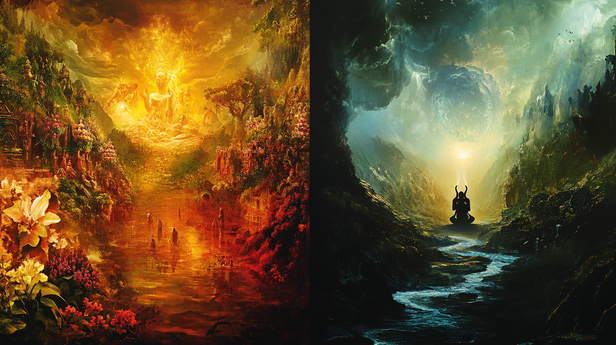What Happens in the Afterlife According to Indian Scriptures
Nikita Kanyal | Jan 27, 2025, 23:27 IST
( Image credit : Timeslife )
What occurs after we pass away? Indian texts unveil intriguing insights regarding the afterlife, ranging from the soul’s passage through the domains of heaven and hell to the enigmatic cycle of reincarnation. Investigate how karma influences your fate, the reasons behind our amnesia of former lives, and the path to attain ultimate liberation (moksha). Uncover the spiritual guide to ready yourself for the afterlife and guarantee your soul’s perpetual tranquility. Be it the bliss of Swarga, the challenges of Naraka, or the liberation of Moksha, your deeds today are influencing your future.
Death has intrigued humans for many centuries. What exists beyond the boundaries of the material realm? Is it void, reincarnation, or everlasting bliss? Indian texts, abundant in spiritual knowledge and classical philosophy, provide intriguing perspectives on the enigmas of the afterlife.
The Journey Begins: What Occurs Immediately Following Death?

According to the Garuda Purana, an age-old Indian text focused on the idea of life after death, the soul does not simply disappear when a person passes away. Instead, it undertakes a journey toward the afterlife. This expedition commences as the soul departs from the physical form. Depending on the person’s karma (actions) throughout their life, the way ahead may be easy or filled with obstacles.
For the first 13 days following death, it is believed that the soul remains linked to the earthly realm, hovering close to its loved ones who are still living. During this period, ceremonies like the Shraddha ritual are performed to aid the soul in its journey and to ensure its tranquil transition.
The Role of Karma: Your Actions Define Your Afterlife
Have you ever encountered the saying, “You reap what you sow”? Indian texts elevate this idea to an even greater significance. The Bhagavad Gita, a revered spiritual text, articulates that the soul carries the karmic history of previous actions as it evolves. Positive actions yield favorable outcomes in the afterlife, whereas negative actions can result in suffering.
The Law of Karma encompasses more than simple retribution or payment; it focuses on equilibrium. It guarantees that the ethical framework of the universe is preserved, and that each soul receives precisely what it merits.
The Realms of the Afterlife: Heaven, Hell, and Beyond

Indian texts outline multiple realms where the soul may dwell after death, contingent upon its karma:
Swarga (Heaven): A paradise where souls enjoy peace, luxury, and divine pleasures. It’s believed to be the reward for good karma, but it’s not permanent. Once the accumulated good karma runs out, the soul returns to the cycle of birth and death.
Naraka (Hell): A place of punishment for those who’ve committed severe misdeeds. The Garuda Purana graphically describes various forms of suffering in hell, tailored to the nature of one’s sins.
Moksha (Liberation): The ultimate goal in Indian philosophy. Moksha signifies freedom from the endless cycle of birth, death, and rebirth (samsara). A soul that attains Moksha merges with the divine and experiences eternal bliss.
Reincarnation: The Wheel of Life Keeps Turning
The concept of reincarnation is central to Indian scriptures. Unlike the Western idea of a single life followed by eternal judgment, Indian philosophy suggests that the soul is immortal and takes on multiple lives to evolve spiritually.
The Upanishads, another set of ancient texts, liken the soul to a traveler changing clothes. Just as we discard old clothes and wear new ones, the soul discards an old body and enters a new one. The circumstances of the next birth—whether one is born into wealth or poverty, health or illness are determined by the karmic balance of previous lives.
The River of Forgetfulness
Ever wonder why we don’t remember our past lives? According to Indian scriptures, the soul crosses the Vaitarani River, a mythical body of water that wipes out memories of previous lifetimes. This ensures that each new life is a fresh start, free from the burdens of the past.
Practice Dharma: Live a life characterized by righteousness, honesty, and kindness.
Meditate and Seek Knowledge: Participating in spiritual activities like meditation, yoga, and the examination of sacred texts helps in the development of the soul and readies it for liberation.
Perform Good Deeds: Acts of charity, kindness, and selflessness build good karma, creating a path toward a more favorable afterlife.
Detach from Materialism: The Bhagavad Gita underscores the significance of freeing oneself from material desires, which can tether the soul to the cycle of rebirth.
The Ultimate Truth: A Personal Journey
Although the afterlife is an immense mystery, Indian scriptures remind us that the primary aim of life is not to dread death but to live with purpose. Regardless of whether you subscribe to reincarnation, heaven, or liberation, the emphasis is on improving yourself in this lifetime.
The afterlife, as depicted in Indian scriptures, is not merely an ending but a fresh start a continuation of the soul’s eternal journey. Therefore, when you next contemplate what awaits beyond, bear in mind: every thought, word, and deed is significant. Your afterlife is being crafted in the present moment.
The Journey Begins: What Occurs Immediately Following Death?

Image Source : TIL
( Image credit : Timeslife )
According to the Garuda Purana, an age-old Indian text focused on the idea of life after death, the soul does not simply disappear when a person passes away. Instead, it undertakes a journey toward the afterlife. This expedition commences as the soul departs from the physical form. Depending on the person’s karma (actions) throughout their life, the way ahead may be easy or filled with obstacles.
For the first 13 days following death, it is believed that the soul remains linked to the earthly realm, hovering close to its loved ones who are still living. During this period, ceremonies like the Shraddha ritual are performed to aid the soul in its journey and to ensure its tranquil transition.
The Role of Karma: Your Actions Define Your Afterlife
The Law of Karma encompasses more than simple retribution or payment; it focuses on equilibrium. It guarantees that the ethical framework of the universe is preserved, and that each soul receives precisely what it merits.
The Realms of the Afterlife: Heaven, Hell, and Beyond

Image Source : TIL
( Image credit : Timeslife )
Indian texts outline multiple realms where the soul may dwell after death, contingent upon its karma:
Swarga (Heaven): A paradise where souls enjoy peace, luxury, and divine pleasures. It’s believed to be the reward for good karma, but it’s not permanent. Once the accumulated good karma runs out, the soul returns to the cycle of birth and death.
Naraka (Hell): A place of punishment for those who’ve committed severe misdeeds. The Garuda Purana graphically describes various forms of suffering in hell, tailored to the nature of one’s sins.
Moksha (Liberation): The ultimate goal in Indian philosophy. Moksha signifies freedom from the endless cycle of birth, death, and rebirth (samsara). A soul that attains Moksha merges with the divine and experiences eternal bliss.
Reincarnation: The Wheel of Life Keeps Turning
The Upanishads, another set of ancient texts, liken the soul to a traveler changing clothes. Just as we discard old clothes and wear new ones, the soul discards an old body and enters a new one. The circumstances of the next birth—whether one is born into wealth or poverty, health or illness are determined by the karmic balance of previous lives.
The River of Forgetfulness
Practice Dharma: Live a life characterized by righteousness, honesty, and kindness.
Meditate and Seek Knowledge: Participating in spiritual activities like meditation, yoga, and the examination of sacred texts helps in the development of the soul and readies it for liberation.
Perform Good Deeds: Acts of charity, kindness, and selflessness build good karma, creating a path toward a more favorable afterlife.
Detach from Materialism: The Bhagavad Gita underscores the significance of freeing oneself from material desires, which can tether the soul to the cycle of rebirth.
The Ultimate Truth: A Personal Journey
The afterlife, as depicted in Indian scriptures, is not merely an ending but a fresh start a continuation of the soul’s eternal journey. Therefore, when you next contemplate what awaits beyond, bear in mind: every thought, word, and deed is significant. Your afterlife is being crafted in the present moment.
